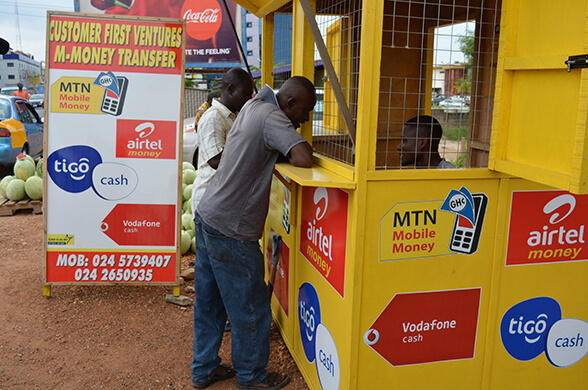The Institute of Statistics, Social, and Economic Research has indicated that the new restriction on mobile money (MoMo) transactions could derail the digitisation of micro, small, and medium-sized enterprises and progress in the cash-lite economy.
In a press statement, the Institute acknowledged that the proposed rate would have a minimal impact on small-value transactions.
However, ISSER noted that the move would adversely impact micro, small, and medium enterprises that rely on MoMo for their financial transactions.
“Worthy of attention is the potential impact on micro and small enterprises, especially traders and farmers within the agricultural value chains concentrated in rural areas.
"For these segments, especially traders and transporters of foodstuffs who rely on MoMo to address security concerns with carrying cash across the country, an increase in cost is likely to be transferred to consumers,” the statement said.
This move, the institute said, could be a trigger for both food and non-food inflation.
The institute raised concern that beyond the move to restrict MoMo transactions, the developing social media-driven e-commerce ecosystem, which relies on MoMo for payment, would also see the transfer of the revised charges to consumers.
“As service providers on the various e-commerce platforms will pass on the charges to consumers in the form of increased prices of goods and services,” the statement said.
In a joint statement copied to the media, MoMo agents around Ghana said they would implement a temporary measure that limits cash withdrawals to GH¢ 1,000 per transaction from December 1.
ISSER said that the potential impact of the restrictions might be significant, particularly for neglected and last-mile populations.
“On average, 76 per cent of mobile money agents are within 30 minutes of consumers in rural areas. On the other hand, it takes two hours for over 50 per cent of rural dwellers to reach an ATM, with only about 40 per cent being able to reach a bank or microfinance in two hours,” the statement said.
This situation ISSER said that many MoMo users in rural areas, where ATMs, banks, and microfinance institutions were not an option, would be confronted with the option of either enduring the high transaction costs or resorting to cash.
Latest Stories
-
Mahama vows to create an agro-processing zone in Afram Plains
4 mins -
Political parties should plan for losses, not just wins – IGP advises
6 mins -
524 Diasporan Africans granted Ghanaian citizenship in ceremony
7 mins -
Mahama urges Afram Plains North residents to avoid ‘skirt and blouse’ voting
9 mins -
Asantehene receives more 19th century gold ornament and regalia
16 mins -
Hohoe Ghana Blind Union organises training for members ahead of Election 2024
23 mins -
Alan Kyerematen reveals his future plans for Ghanaian Health professionals
24 mins -
AAIN empowers women and small enterprises in Upper East Region through SHINE project
25 mins -
Akufo-Addo leads nationwide commissioning of 80 educational projects
31 mins -
Ghana and Seychelles strengthen bilateral ties with focus on key sectors
1 hour -
National Elections Security Taskforce meets political party heads ahead of December elections
1 hour -
Samsung’s AI-powered innovations honored by Consumer Technology Association
1 hour -
Fugitive Zambian MP arrested in Zimbabwe – minister
2 hours -
Town council in Canada at standstill over refusal to take King’s oath
2 hours -
Trump picks Pam Bondi as attorney general after Matt Gaetz withdraws
2 hours

